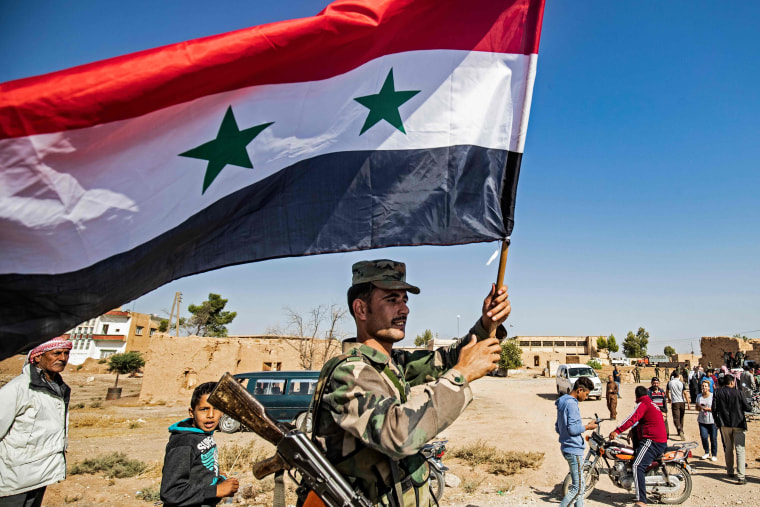TURKISH-SYRIAN BORDER — Syrian government troops were headed north toward the Turkish border Monday after the Kurds called on Damascus and Moscow for military assistance to repel the advancing Turkish forces, according to Syrian state media and a human rights monitoring group.
Regime forces are currently less than four miles away from the border with Turkey and are expected to advance farther toward the area surrounding the border town of Ras al Ayn, according to the Syrian Observatory of Human Rights, a monitoring group based in Britain.
On the Turkish side of the border, dozens of armored vehicles, Turkish tanks and military equipment streamed toward the front lines. Across the border in Syria, Turkish F-16 fighter jets could be seen circling over the town of Qamishlo, the administrative center of the Kurdish autonomous authority.
The deployment came as the United States heads toward an almost total withdrawal from Syria and the civilian death toll reached 39, according to the Kurdish Red Crescent.
Syrian regime troops began heading north Sunday to repel Turkish troops in the towns and border territories north of the city of Hasaka and the region of Raqqa, the state-run Syrian Arab News Agency reported.
"The forces of the Turkish regime committed massacres of civilians and occupied territories and destroyed infrastructure," it added.

On Monday, the Syrian flag was hoisted over state institutions in the town of Qamishli on the Turkish-Syrian border, as government troops reached several towns and villages in northeastern Syria, the news agency reported. NBC News could not immediately confirm these reports.
Most of Qamishli currently falls under the political and military control of the Kurdish autonomous administration, according to the Rojava Information Center, a pro-Syrian Democratic Forces research group based in the town.
Aldar Xelil, a senior Kurdish official, said Monday that the regime would take positions along the border but the political administration of the area would mainly continue to fall under the autonomous administration.
Xelil said negotiations were still ongoing and that Russia wanted to negotiate "directly with the Kurds."
Kurdish troops turned to the Syrian government and Russia for help Sunday, according to a Kurdish military official, in a move that could increase Russian President Vladimir Putin's influence in Syria, deal a substantial blow to the Kurds’ ambitions of independence in the region, and be seen as a win for Syrian President Bashar al-Assad.
The announcement represents a major shift in alliances for Syria's Kurds, who were longtime partners with the U.S. in the fight against the Islamic State militant group. The decision also sets up a potential clash between Turkey and the Syrian government and raises the possibility of a resurgent Islamic State group.
“Nobody supports us. This is why we made an agreement with the Russians and the Syrian government,” said Ismat Sheik Hassan, a Kurdish official who leads the Kobani Military Council.
Mazloum Abdi, the commander in chief of the Kurdish-led Syrian Democratic Forces, wrote in an article for Foreign Policy on Sunday that “we know that we would have to make painful compromises with Moscow and Bashar al-Assad if we go down the road of working with them."
“But if we have to choose between compromises and the genocide of our people, we will surely choose life for our people,” he said.
President Donald Trump dismissed interventions by other countries as unimportant.
“Others may want to come in and fight for one side or the other,” he posted on Twitter Sunday. “Let them!”
Fawaz Gerges, a professor of Middle Eastern politics at the London School of Economics, said the decision by the Kurds meant that Putin, and not Trump, was now in control of Syria and beyond.
He said he didn't think Syria and Turkey would clash in coming days and that Russia would be able to step in and broker a deal.
"A new regional order is in the making. The Syrian moment might be remembered as a turning point in the emergence of this new regional order," he said.
The development represents a win for Russia and Iran, which have backed Assad's regime since 2011 when his violent effort to crush peaceful protests against his family's rule turned into a full-blown civil war.
It will also further cement Assad's hold over the war-ravaged country. The Kurdish dream of a separate entity or state is now over, according to Gerges.
Trump's "decision to withdraw U.S. forces from Syria and greenlight the Turkish assault hammered a deadly nail in the coffin of the Kurdish dream," he said.
“The Kurdish territories fell like ripened fruit into Assad’s mouth,” he added.
U.S. Defense Secretary Mark Esper told CBS' “Face the Nation” in an interview Sunday that around 1,000 American troops would leave the area as quickly as possible. Only around 300 soldiers would remain in Syria, two U.S. military officials in the region told NBC News.
Putin told Sky News Arabia on Sunday that "all forces deployed illegitimately inside any sovereign state — in this case Syria — must leave."
"The territorial integrity of the Syrian Arab Republic must be completely restored," Putin added.
The intensification of the conflict came as the SDF and the Syrian Observatory of Human Rights said Sunday that close to 800 members of a camp holding the families of ISIS fighters had escaped after Turkish shelling. NBC News could not immediately confirm these reports.
Trump has been widely criticized by U.S lawmakers for stepping aside in the region to allow the Turkish offensive. The Kurdish Syrian Democratic Forces fought ISIS alongside U.S. forces for years.
In response to reports that some ISIS fighters may have escaped, Trump tweeted Monday that “Kurds may be releasing some to get us involved.”
“Easily recaptured by Turkey or European national from where many came, but they should move quickly,” he said.
He also warned that “big” sanctions were coming against Turkey.
Mac William Bishop reported from the Turkish-Syrian border. Saphora Smith reported from London.
